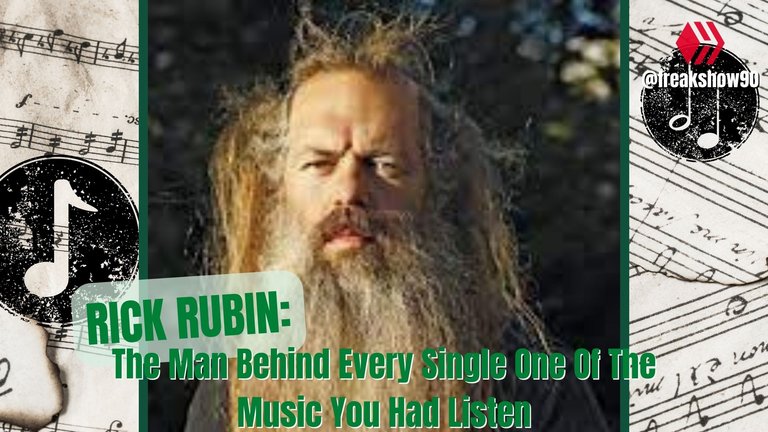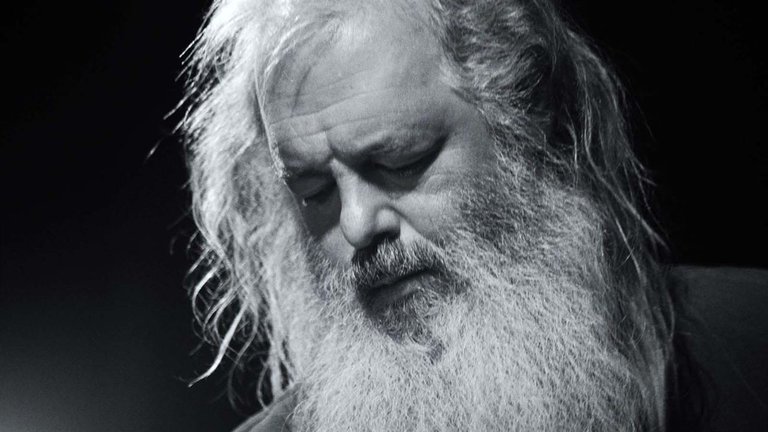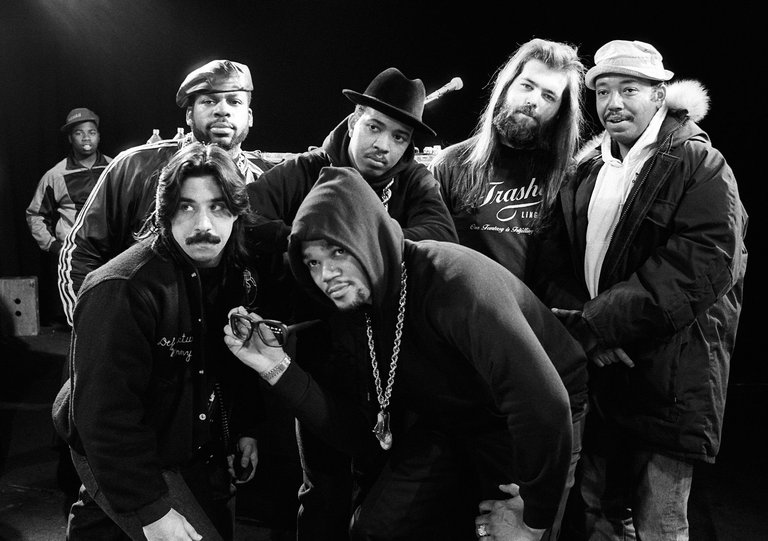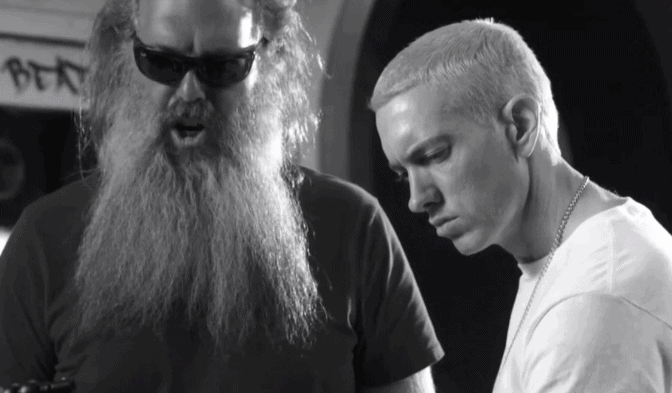

Often when we get our hands on a record that is immortal (and yes, think of any record that comes to mind, by any artist; your favourite) we don't really think about how hard it is to make music. You see, virtue or talent alone is not enough. What's more, on a commercial level, these attributes go largely unnoticed. If they were fundamental and necessary, the best records in history would come from music conservatories all over the planet; and this is not at all the case. With this somewhat banal background in mind, it is time to introduce you to a music producer, who is not only a visionary, but a complete genius. Quite simply, the best albums since at least 1986 to date have passed through his wise hands; I'm talking about Rick Rubin.
This guy is so overlooked, it seems like a joke to me. Obviously, over the years, and with the advent of social media, the gap has narrowed somewhat. But even in academia, professionally and within the producers' guild itself, there are people who still have a certain suspicion (envy) of Rick Rubin. Plain and simple, they don't consider him one of their own. They argue that he is very lucky and that technically he leaves a lot to be desired, over-saturating the records he produces and in many cases, turning them into a kind of structured noise, which is then sold with commercial success.
Muchas veces cuando tenemos en nuestras manos un disco que es inmortal (y sí, piensa en cualquier que se te venga a la mente, de cualquier artista; tu favorito) realmente no pensamos en lo difícil que es hacer música. Verán, no basta solamente con la virtud o el talento. Es más, a nivel comercial, éstos atributos pasan bastante desapercibidos. Si fueran fundamentales y necesarios, los mejores discos de la historia provendrían de los conservatorios de música de todo el planeta; y ésta no es para nada realidad. con este antecedente un poco banal en mente, es hora de presentarles a un productor musical, que no solo es un visionario, sino un completo genio. Sencillamente, los mejores álbumes desde, al menos 1986, hasta la fecha han pasado por sus sabias manos; les hablo de Rick Rubin.
Este sujeto es tan poco tomado en cuenta, que a mí modo de ver, parece una broma. Obviamente, con los años, y la aparición de las redes sociales, la brecha se ha estrechado un poco. Pero incluso, en el aspecto académico, profesional y dentro del mismísimo gremio de productores; existen actualmente personas que aún mantienen cierto recelo (envidia) a Rick Rubin. Simple y llanamente, no lo consideran uno de los suyos. Argumentan que es alguien con mucha suerte y que técnicamente deja mucho que desear, sobre saturando los discos que produce y en muchos casos, volviéndolos una especie de ruido estructurado, que luego se vende con éxito comercial.


Well, having said that, let's examine how true these "arguments" are. And I'll start with the first proof of the material made by this guy: Reign in Blood, by Slayer (1986) an album, which is not only a must-have for every consumer of good metal, especially San Francisco trash, but it was the direct competition of another monstrosity in the history of music, such as Metallica's Master Of Puppets (which was not produced by Rubin). Now, in that year, no album sold more or revolutionized more than the one made by the creators of "Battery" but one thing was clear, a guy who only knows how to play the guitar, modestly, and who comes from New York, a lover of The Ramones and who lived the first wave of Hip Hip, in Brooklyn, had made one of the best thrash metal albums ever recorded.
He continued. In the same decade, it would never have occurred to anyone to mix classic hip hop with rock and roll, and Mr. Rubin not only did it, but created one of the most classic hits of this fusion. RUN DMC and Aerosmith made "Walk This Way" possible. Originally written by the Boston rock band, and with the producer's help, it served as the kick-off for the Steven Tayler-led group's revival, which also brought about one of the best hip hop albums in history. It was on MTV, won awards, sold billions of records worldwide and is still a hit we've all heard at one time or another. Regardless of genre or musical palate.
Bueno, dicho lo antes expuesto, examinaremos qué tan cierto son esos "argumentos". Y empezaré con la primera prueba del material hecho por este sujeto: Reign in Blood, por Slayer (1986) un álbum, que no solo es de demanda necesaria para todo consumidor del buen metal, sobre todo del trash de San Francisco, sino que fue la competencia directa de otra monstruosidad de la historia de la música, como fue el Master Of Puppets, de Metallica (que no fue producido por Rubin). Ahora bien, en ese año, ningún álbum vendió más o revolucionó más que el hecho por los creadores de "Battery" pero algo sí quedó bien claro, un sujeto que solo sabe tocar la guitarra, modestamente, y que proviene de New York, amante de The Ramones y que vivió la primera ola del Hip Hip, en Brooklyn, había hecho uno de los mejores discos de thrash metal jamás grabados.
Continúo. En la misma década, jamás a nadie se le hubiese ocurrido mezclar el hip hop clásico con rock and roll, y el señor Rubin no sólo lo hizo, sino que creó uno de los éxitos más clásicos de esta fusión. RUN DMC y Aerosmith, hicieron posible "Walk This Way". Originalmente compuesta por la banda de Boston de rock, y que con ayuda del productor sirvió como puntapié inicial para la reavivación del grupo liderado por Steven Tayler y que además, trajo como colofón uno de los mejores álbumes de hip hop de la historia. Salió en la MTV, ganó premios, vendió miles de millones de discos en todo el mundo e incluso, aún es un éxito que todas y todos alguna vez hemos escuchado. Independientemente del género o el paladar musical que tengamos.

In this sense, the Beasties Boys, Rage Against The Machine, Public Enemy, Audioslave, Velvet Revolver, Jay-Z, Eminem, Alicia Keys, Lady Gaga, Red Hot Chili Peppers, Linkin Park, Limp Bizkit, System Of A Down, AC DC, Lana Del Rey, Weezer, Kaney West, Metallica; and even Black Sabbath, passed through the hands and above all through the philosophy of this man. And this last section is something to which I am going to dedicate a few lines because it is absolutely elementary to understand how Rick Rubin's working relationship works with the bands, artists, solo artists, groups and performers he has worked with over his more than 50-year career.
There is a beautiful documentary of the Peppers' "Sugar, Blood, Sex, Magik", where there is a bearded, chubby man with dark glasses, moving from one side to the other; that's Rubin. In it, the producer is heard talking calmly to Flea and Anthony Kiedis about some of the things they should be conveying on the album. Then, the end result, it seems, hasn't disappointed anyone, or am I lying? And this, to me, is the real key to Rick Rubin's success. He really cares about working with the humanity behind the bands or solo artists he's talking to. He doesn't see multi-millionaires, creative blockers, or those with pretensions of grandeur; instead, he focuses on their desires. What they have in their heads, and together with his suggestions, they try to realise it.
En este sentido, los Beasties Boys, Rage Against The Machine, Public Enemy, Audioslave, Velvet Revolver, Jay-Z, Eminem, Alicia Keys, Lady Gaga, Red Hot Chili Peppers, Linkin Park, Limp Bizkit, System Of A Down, AC DC, Lana Del Rey, Weezer, Kaney West, Metallica; e incluso Black Sabbath, pasaron por las manos y sobre todo por la filosofía de este hombre. Y este último apartado, es algo a lo que voy a dedicar algunas líneas porque es absolutamente elemental para comprender cómo funciona la relación de trabajo que plantea Rick Rubin con las bandas, artistas, solistas, grupos e intérpretes con los que ha trabajado a lo largo de sus más de 50 años de carrera.
Hay un documental precioso del "Sugar, Blood, Sex, Magik" de los Peppers, donde están un hombre barbudo, regordete y con gafas oscuras, moviéndose de un lado hacia el otro; ése es Rubin. En él, se oye al productor hablar en tono calmado con Flea y Anthony Kiedis sobre algunas de las cosas que deberían transmitir estos dentro del álbum. Luego, el resultado final, parece que no ha decepcionado a nadie, ¿o miento? Y esta, para mí, es la clave real del éxito de Rick Rubin. Realmente, le importa trabajar con la humanidad detrás de las bandas o solistas con los que está hablando. No ve a multimillonarios, con bloqueo creativo o con ínfulas de grandeza; al contrario, se concentra en sus deseos. En lo que éstos tienen en sus cabezas, y junto a sus sugerencias, intentan llevarlo a cabo.


Clearly, this is exhausting work. The best example of this can be seen in the very creation of the band Audioslave. Legend has it that when Rage Against The Machine first broke up (in the early 2000s) most of the band members (minus Zack de la Rocha) wanted to keep recording and playing but didn't have a vocalist. They went to Rubin, and he said something that would blow their minds, "What if we tried a Grunge vocalist?" The person Rubin was referring to was none other than Chris Cornell. Is there anything else left to say? The rest is simple and beautiful history.
This man was an absolute pioneer. He saw the wonderful influence that hip hop has with so many genres of music; especially rock and pop, and fused them together. He was also a total forerunner of the New Metal movement, where from the 80's, 90's and finally the golden age of this sub-genre he was with the biggest exponents. Creating famous albums. I could put a list of the 100 albums produced by Rick Rubin and you simply wouldn't believe how diverse this guy has been. It's just incredible. I'll tell you one thing, and I'm not exaggerating, almost all of the best rock, pop, soul and hip hop albums since the last 40 years are by this guy.
Claramente, es un trabajo agotador. El mejor ejemplo de esto, lo podemos ver en la mismísima creación de la banda Audioslave. Cuenta la leyenda, que cuando Rage Against The Machine se separó la primera vez, (empezando la década de los 2000's) la mayoría de miembros de la banda (menos Zack de la Rocha) deseaban seguir grabando y tocando pero no tenían al vocalista. Acudieron con Rubin, y éste les dijo algo que les volará la cabeza "¿Y si lo intentamos con un vocalista de Grunge?" La persona a la que se refería Rubin, era nada más y nada menos que Chris Cornell ¿Queda algo más que decir? Lo demás es sencilla y hermosa historia.
Este hombre fue un absoluto pionero. Vio la maravillosa influencia que tiene el hip hop con muchísimos géneros de la música; y en especial con el rock y con el pop, y desde siempre los fusionó. Además, fue un total adelantado al movimiento del New Metal, donde desde los 80's, 90's y finalmente la época dorada de este subgénero estuvo con los mayores exponentes. Creando álbumes famosos. Podría colocar una lista de los 100 álbumes producidos por Rick Rubin y sencillamente no podrían creer lo diverso que ha sido este sujeto. Es sencillamente increíble. Algo sí les digo, y no exagero, casi todos los mejores discos del rock, pop, soul y hip hop, desde los últimos 40 años son de este tipo.

Some people say that Slipknot, the huge and talented band from Iowa in the United States, were one of the few who were not satisfied after working with Rubin, but this guy produced nothing less than "Vol.3: The Subliminal Verses", which is a beast of an album. Even so, not everything is perfect and I presume that the band, led by Corey Taylor, didn't end up being convinced. Sometimes you win and sometimes you lose. What is certain is that history is there to be evaluated. And music, as a manifestation of humanity, is also present in almost every aspect of our lives. Therefore, who would say that those albums that we love so much, by the artists that have marked us so much, were made possible by a guy behind the curtain and that even if you name him two thousand times, you still don't recognise him? They say that the Devil is in the details, and this is a reliable proof of this saying.
Dicen que Slipknot, la enorme y talentosa banda de Iowa en los Estados Unidos, fueron unos de los pocos que no resultaron satisfechos después de trabajar con Rubin, pero este sujeto les produjo nada más y nada menos que el "Vol.3: The Subliminal Verses", que es una bestialidad de disco. Aún así, no todo es perfecto y presumo que a la banda liderada por Corey Taylor, no les terminó convenciendo. A veces se gana y otras, se pierde. Lo cierto es que, la historia está ahí para ser evaluada. Y la música, como manifestación de la humanidad también está presente en casi todo aspecto de nuestras vidas. Por tanto, ¿quién diría que aquellos álbumes que tantos amamos, de los artistas que tanto nos han marcado, fueron posibles por un sujeto detrás de la cortina y que aunque te lo nombre dos mil veces, aún no lo reconoces? Dicen que el Diablo está en los detalles, y ésta es una prueba fidedigna de este refrán.
